Landscape Gardening in Notting Hill
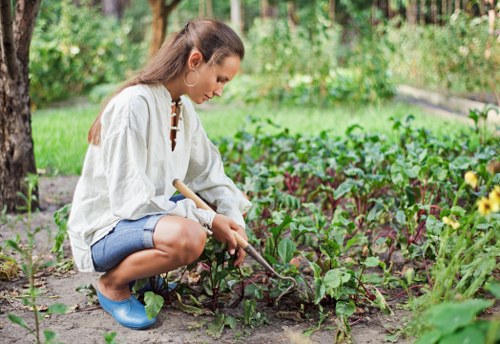
Notting Hill, an iconic neighborhood in London, is renowned for its vibrant culture, stunning architecture, and picturesque streets. One of the key elements that enhance its charm is landscape gardening. Whether you're a homeowner looking to revamp your garden or a professional gardener aiming to create breathtaking outdoor spaces, understanding the unique landscape gardening needs of Notting Hill is essential.
Landscape gardening in Notting Hill involves a blend of traditional and contemporary techniques tailored to the local climate and architectural styles. The goal is to create harmonious outdoor environments that complement the scenic beauty of the area while providing functional and aesthetic value to residents and visitors alike.
In this comprehensive guide, we'll explore the various aspects of landscape gardening in Notting Hill, including plant selection, design principles, maintenance tips, and the latest trends that can help you transform your garden into a stunning oasis.
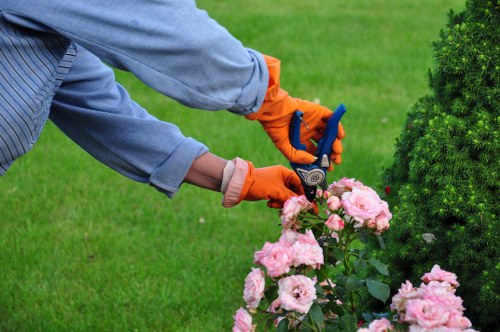
Understanding the Climate of Notting Hill
Before embarking on any landscape gardening project, it's crucial to understand the climate of Notting Hill. Located in London, the area experiences a temperate maritime climate characterized by mild summers, cool winters, and moderate rainfall throughout the year. This climate provides an excellent environment for a diverse range of plants, from perennial flowers to hardy shrubs and trees.
The moderate temperatures and consistent rainfall mean that gardeners in Notting Hill can cultivate lush, green gardens with relatively low maintenance. However, understanding seasonal changes is key to selecting the right plants and implementing effective gardening strategies.
Seasonal Considerations
Each season presents unique challenges and opportunities for landscape gardening:
- Spring: A time for planting new blooms and preparing the garden for the growing season.
- Summer: Focus on maintaining plant health during warmer months and managing irrigation.
- Autumn: Ideal for planting trees and shrubs and preparing the garden for winter.
- Winter: Emphasize protective measures for plants and plan for the upcoming gardening year.
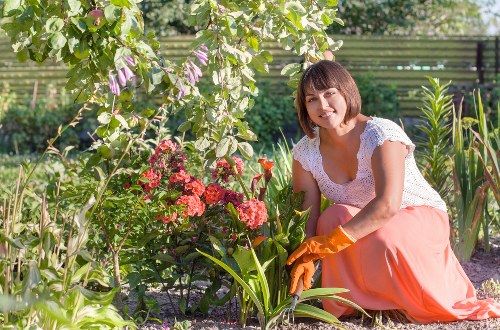
Choosing the Right Plants for Notting Hill Gardens
Plant selection is a cornerstone of successful landscape gardening. In Notting Hill, the diversity of plant life can range from colorful annuals to robust perennials that thrive in the local climate.
Flowering Plants
Incorporating a variety of flowering plants can add color and vibrancy to your garden. Popular choices include:
- Roses: Known for their timeless beauty and fragrance.
- Lavender: Adds a touch of purple and is excellent for attracting pollinators.
- Hydrangeas: Offer large, showy blooms that are perfect for garden borders.
These plants not only enhance the visual appeal but also contribute to the ecological balance by supporting local wildlife.
Shrubs and Trees
Shrubs and trees provide structure and height to your garden design. Consider plants like:
- Boxwood: Ideal for creating neat hedges and topiaries.
- Japanese Maple: Offers striking foliage and adds a focal point to your garden.
- Magnolias: Known for their impressive blooms and evergreen foliage.
Choosing the right shrubs and trees ensures longevity and sustainability in your garden's design.
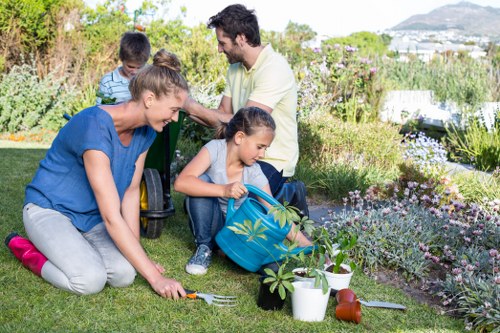
Design Principles for Landscape Gardening in Notting Hill
Effective garden design combines functionality with aesthetics. Here are some key principles to consider:
Balance and Harmony
Achieving visual balance involves distributing elements evenly across the garden space. Symmetrical designs create a formal look, while asymmetrical arrangements offer a more relaxed and natural feel.
Focal Points
Incorporating focal points such as a water feature, sculpture, or a striking plant can draw attention and add interest to your garden. These elements serve as anchors around which other garden features are organized.
Color Coordination
Choosing a cohesive color palette enhances the overall harmony of the garden. Consider the colors of your plants, flowers, and any garden decorations to ensure they complement each other.
Texture and Variety
Mixing different textures—such as smooth leaves with fuzzy foliage—adds depth and intrigue to your garden. Variety in plant types and shapes can prevent monotony and keep the garden visually stimulating.
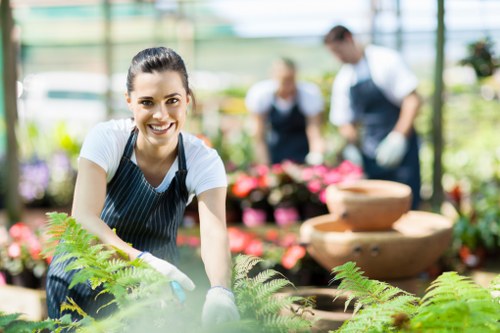
Incorporating Sustainable Practices
Sustainability is increasingly important in landscape gardening. Incorporating eco-friendly practices not only benefits the environment but also ensures the long-term health of your garden.
Water Conservation
Implementing efficient irrigation systems, such as drip irrigation, can significantly reduce water usage. Additionally, selecting drought-resistant plants ensures that your garden remains vibrant even during dry spells.
Soil Health
Maintaining healthy soil is essential for plant growth. Regularly adding organic matter, such as compost, improves soil fertility and structure. Mulching also helps retain moisture and suppress weeds.
Native Plants
Choosing native or locally adapted plants promotes biodiversity and reduces the need for excessive maintenance. Native plants are well-suited to the local climate and support local wildlife.
Organic Gardening
Avoiding chemical fertilizers and pesticides minimizes environmental impact. Opt for organic alternatives to protect beneficial insects and maintain a balanced ecosystem.

Maintenance Tips for a Thriving Garden
Regular maintenance is crucial for keeping your garden healthy and beautiful. Here are some essential tips:
Pruning and Trimming
Pruning helps maintain the shape of plants and encourages healthy growth. Regular trimming prevents overgrowth and promotes better airflow, reducing the risk of diseases.
Weed Control
Weeds compete with your plants for nutrients and water. Implementing preventive measures, such as mulching and regular weeding, keeps unwanted plants in check.
Fertilization
Providing the right nutrients ensures vigorous plant growth. Use balanced fertilizers tailored to the specific needs of your plants and garden conditions.
Pest Management
Monitor your garden regularly for signs of pests and diseases. Early detection and organic treatment methods can prevent infestations and maintain plant health.
Seasonal Care
Adjust your maintenance routines based on the seasons. For example, protect plants during winter frosts and ensure adequate watering during the dry summer months.

Latest Trends in Landscape Gardening
Staying updated with the latest trends can keep your garden modern and stylish. Here are some popular trends in landscape gardening:
Vertical Gardens
With limited space, vertical gardens maximize plant growth by utilizing vertical surfaces. This trend is perfect for urban settings like Notting Hill, where space can be at a premium.
Eco-Friendly Features
Incorporating elements like rainwater harvesting systems, solar lighting, and green roofs promotes sustainability and reduces the environmental footprint of your garden.
Minimalist Design
Embracing simplicity with clean lines and uncluttered spaces highlights the beauty of individual plants and garden features. Minimalist gardens often use a limited color palette and geometric shapes.
Smart Gardening
Integrating technology, such as automated irrigation systems and garden monitoring sensors, enhances efficiency and ease of maintenance.

Local Regulations and Garden Planning
When planning your garden, it's important to be aware of any local regulations or guidelines specific to Notting Hill. These may include:
Planning Permissions
For significant alterations, such as installing large structures or extensive landscaping, obtaining planning permission from local authorities may be necessary.
Heritage Conservation
Notting Hill is home to many historic buildings and properties. Ensuring that your garden design respects and complements the heritage aspects is essential.
Zoning Laws
Understanding zoning laws helps in determining what types of plants, structures, and garden features are permissible in your area.
Community Guidelines
Some neighborhoods have specific guidelines regarding garden aesthetics, such as color schemes or plant types. Consulting with local community boards can provide clarity.

Hiring Professional Landscape Gardeners
While DIY gardening is rewarding, hiring professional landscape gardeners can elevate your garden to new heights. Professionals bring expertise in design, plant selection, and maintenance, ensuring a cohesive and thriving garden.
Benefits of Professional Services
- Expertise: Professionals have in-depth knowledge of plants, design principles, and maintenance techniques.
- Time-Saving: Hiring experts allows you to focus on other aspects of your life while they manage your garden.
- Customized Designs: Professionals can create tailored garden designs that reflect your personal style and meet your specific needs.
Choosing the Right Gardener
When selecting a landscape gardener in Notting Hill, consider the following:
- Check credentials and experience.
- Review portfolios and client testimonials.
- Ensure they understand and align with your gardening vision.
- Discuss pricing and service offerings transparently.
Investing in professional landscape gardening services can transform your outdoor space into a beautiful and functional retreat.
Contact us today

Enhancing Your Garden with Outdoor Living Spaces
Creating outdoor living spaces extends the functionality of your garden, providing areas for relaxation, entertainment, and social gatherings.
Patios and Decks
Installing patios or decks offers a stable surface for outdoor furniture, dining areas, and recreational activities. Materials like wood, stone, and composite decking are popular choices.
Water Features
Incorporating water features, such as ponds, fountains, or waterfalls, adds a soothing element to your garden. The sound of running water can enhance the ambiance and attract wildlife.
Lighting
Proper lighting extends the usability of your garden into the evening hours. Options include solar-powered lights, LED fixtures, and ambient lighting to highlight key features.
Fire Pits and Heaters
Adding fire pits or outdoor heaters creates a warm and inviting atmosphere, making your garden a comfortable space even during cooler seasons.
Furniture and Accessories
Selecting comfortable and weather-resistant furniture, along with decorative accessories, completes the outdoor living experience. Consider elements that reflect your personal style and complement the overall garden design.
Book your service now

Integrating Sustainable Landscaping Practices
Sustainability is a key consideration in modern landscape gardening. By implementing eco-friendly practices, you can reduce your garden's environmental impact while maintaining its beauty and functionality.
Composting
Composting organic waste recycles nutrients back into the soil, enhancing fertility and structure. It reduces the need for chemical fertilizers and supports healthy plant growth.
Rainwater Harvesting
Collecting and utilizing rainwater for irrigation conserves water resources and ensures your garden remains hydrated during drier periods.
Native and Drought-Resistant Plants
Choosing plants that are native or drought-resistant minimizes water usage and supports local biodiversity.
Green Materials
Using sustainable materials for garden structures and pathways, such as reclaimed wood or recycled stone, reduces waste and promotes environmental responsibility.
Energy-Efficient Lighting
Opting for energy-efficient lighting solutions, like LED bulbs and solar-powered fixtures, decreases energy consumption and lowers utility costs.

Maximizing Small Garden Spaces
Notting Hill's urban setting often means limited garden space. However, with thoughtful design and creative solutions, even small gardens can become lush and inviting.
Vertical Gardening
Utilizing vertical space with trellises, wall-mounted planters, and espaliered plants allows you to grow more without occupying valuable ground space.
Compact Plant Varieties
Choosing compact and dwarf plant varieties ensures that your garden remains manageable and doesn't overwhelm the space.
Multi-Functional Furniture
Incorporating furniture that serves multiple purposes, such as storage benches or foldable tables, optimizes functionality in small gardens.
Mirrors and Reflective Surfaces
Strategically placed mirrors and reflective surfaces can create the illusion of a larger space, adding depth and brightness to your garden.

Conclusion
Landscape gardening in Notting Hill offers a unique opportunity to create beautiful and sustainable outdoor spaces that reflect the charm and character of this vibrant neighborhood. By understanding the local climate, selecting the right plants, adhering to design principles, and incorporating sustainable practices, you can transform your garden into a serene and aesthetically pleasing retreat.
Whether you're a seasoned gardener or just starting out, embracing these insights can help you achieve a thriving and harmonious garden. Don't hesitate to contact us today to bring your landscape gardening vision to life or book your service now to enjoy a beautifully landscaped garden in the heart of Notting Hill.

